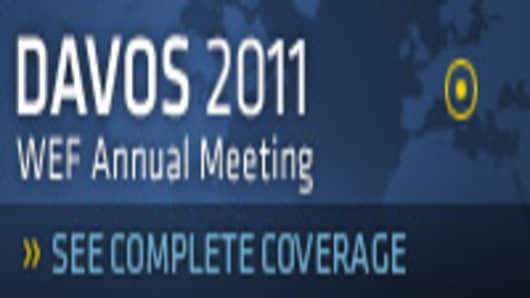Reviving global growth will be one of the key policy debates at the World Economic Forum's annual meetingthis week in Davos, Switzerland.
Government policymakers might want to emulate global mutual-fund managers, who are having no trouble finding growth stories across the developing world and in pockets of developed markets.
“Emerging markets will be the superior growth region because their governments have more flexibility to drive and stimulate their economies,’’ says Bill Kornitzer, manager of the Buffalo International Fund .
That flexibility is a result of prudent responses to the emerging markets crises of the late 1990s that have positioned countries like Brazil, Russia, India and China, known collectively as the BRICs, in the vanguard of the global economy.
While the U.S. and Europe struggle under severe debt burdens, the BRICs—with the exception of Russia—came out of the financial crisis relatively unscathed and ready to resume their robust growth.
Investors have jumped on the emerging market bandwagon in droves, pouring nearly $25 billion into emerging-market equity funds over the last year, according to Morningstar. Such exuberance could be a sign of a market top, at least in the short term, cautions Pedro Noronha, a fund manager at Noster Capital.
“Everybody is already in that trade and emerging-markets assets are at the highest valuation vis-à-vis developed markets that has ever been register,’’ Noronha wrote in a recent letter to investors.
Overlooking the downsides of the region’s popularity, fund managers say emerging markets do offer access to several powerful long-term investment themes: higher GDP growth rates and emerging middle-class consumption.
One way to gain more measured exposure to these themes as well as less heralded growth opportunities is through global mutual funds that own stocks of companies from both developed and emerging markets.
Buffalo International, which has gained an average of 2.68 percent over the last three years compared to a loss of 1.38 percent for similar foreign, large-growth funds, allocates about 35 percent of its portfolio to stocks in emerging markets.
The fund’s emerging-market weighting has increased as governments and companies have improved transparency and accounting standards. A sharp drop in trading costs has also made these markets more attractive, says Kornitzer.
Serving The Consumer
Investing in emerging markets enables Kornitzer to participate in the slow rise of the middle class around the world. The middle class there is expected to grow from 400 million in 2000 to 1.2 billion by 2030, according to the World Bank. In China, India, and Indonesia alone, 400 million people are poised to move from agrarian economies into higher-paying service and manufacturing jobs.
While the U.S. generates GDP per capita of $45,000, the rest of the world generates just $7,000 of economic growth per person. That gap should narrow with the spread of information and trade and allow the rest of the world to become consumers, Kornitzer says.
In addition to owning stocks in local emerging markets, Buffalo International taps the EM consumer by owning multinationals based in Hong Kong and the developed world. Hong Kong’s Asian Citrus, one of the fund’s largest holdings, caters to Chinese consumers focused on healthier diets.
Kornitzer has also been adding to European food and beverage stocks that serve global end markets like Diageo, Pernod Ricard , and Danonethat came under pressure in late 2010 due to the region’s debt woes.
“Big multinationals benefit from global diversification and access to higher growth markets,’’ he says, adding that investors should be wary of owning stocks of companies without a global presence.
The consumer class has gained wealth so rapidly in China and elsewhere that it’s now focused on luxury goods. Kornitzer saysSwatch Group“has been going crazy” in emerging markets as it can’t keep enough high-end Swiss watches in stock.
Targeting Global Small Caps
Wasatch International Opportunities Fund, which has gained an average of 5.45 percent over the last three years compared to a gain of 1.69 percent for similar foreign small-mid growth funds, invests about 30 percent of its assets in emerging markets but fund manager Blake Walker picks these stocks based not on location but business quality.
He insists on stocks with good balance sheets, above-average margins and EPS growth, and sustainable competitive advantages.
“EM management teams are as good if not better than U.S. management teams,’’ says Walker, pointing out that companies in the developing world have learned to cope with political, currency and stock market crises. “They navigate difficult waters very well.’’
Walker sees similar promise in small and micro cap stocks in developed markets, an underfollowed asset class that is his fund’s main target. With a universe of companies more than three times larger than the U.S. market and a much more active IPO market, he can be very picky about the stocks he chooses.
Smaller companies can grow regardless of their country’s GDP. Take Japan where online retailer Start Today and clinical research organization EPS – both major holdings of the fund – are thriving in an anemic economy.
Growth can also be found in export-driven countries like Germany and South Korea that generate more than 50 percent of sales outside their borders. Walker is playing the export trend through German online payment processor Wirecard and Korean Web advertiser Daum Communications.
Investors’ preoccupation with emerging markets actually works to the advantage of developed market small caps. “There’s a huge investable universe out there not a lot of people are focused on.” says Walker.
In addition to actively managed global funds, investors can gain growth exposure through ETFs.
iShares MSCI All Country Asia Ex-Japan Index , for instance, invests in ten Asian markets both developed and emerging with a heavy weighting in China, South Korea, Taiwan, Hong Kong and India. Vanguard FTSE All-World Ex-US Small Cap ETF trolls in waters similar to Wasatch International Opportunities with a 23% weighting in emerging markets.
Plenty of the world’s companies are already growing smartly. Should policymakers in Davos succeed in efforts to bolster infrastructure development and encourage freer trade of goods and intellectual capital, the universe of global growth stocks should expand even more.



